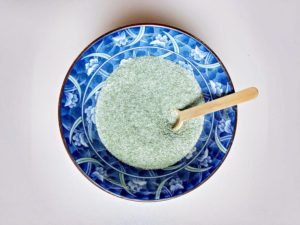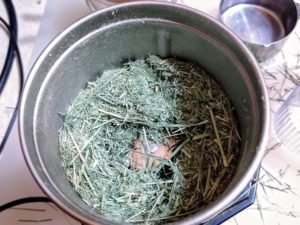Green Grass Salt
by Guest blogger: Kimberly Kling
of Joyful Roots
Listen to her podcast HERE
[dt_divider style=”thin” /]
Sometimes we discover that the things we most admonish turn out to be a gift… or at least, they aren’t as bad as they originally seem. This happens to me in my garden from time to time. Over the last few years I have been getting to know the weeds in my garden on a deeper level, and in doing so I have discovered many of those pesky weeds have become friends.
Cursed weed
Bermuda grass is one plant that I’m slowly changing my mind about. If you live and garden in a warmer climate, you have probably had a run in with this grass. It’s very prolific. It is originally from Africa, is fast growing, dark green, and creeps via underground and above ground runners. In my garden, I’ve at times waged war, cursed it, and ripped it out because it grows so quickly and abundantly that it chokes out my garden plants and makes it impossible to keep my garden “weeded.” My relationship to this plant is complicated – love/hate.
As it turns out, some of our most abundant weeds, are really food or medicine in disguise. Talk about being provided for! I no longer call anything in my garden a weed, but prefer the term “wildling” instead.
Elevated status
I was somewhat shocked to learn that Bermuda grass, or Cynodon dactylon, is considered a sacred plant in Hindu culture where it is also called Durva grass or Arugampul. It has been used in temples for roughly 3,500 years, where it is given as an offering to Ganesha and considered to have properties of purification and perseverance. It has also been used by medieval herbalists to treat inflamed bladders, painful urination, water retention and for its antiseptic properties. It contains Vitamin C, carotene, palmitic acid, and more compounds which are part of its beneficial nature. Alcohol extracts of the whole plant have been shown to have broad spectrum antibacterial and antiviral properties. It is comparable to wheat grass in terms of using it for a general tonic and is alkalizing for the body. It can be juiced, tinctured, and dried and powdered.
Nutritional inspiration
This knowledge has inspired me to experiment with using Bermuda grass in my cooking. It’s the most prolific plant in my yard, so why not? I’ve added it to smoothies, used it in soups, dried and powdered it for sprinkling on food, and used it topically as a poultice for bug bites. One of my favorite things to use in the kitchen is herbal salts. They can be used to enhance flavor and add nutrition to meals. Recently I made a Bermuda grass salt which has been fun to add to recipes. Bermuda grass has a fairly mild flavor, so it’s actually not all that noticeable in most dishes but gives them a little nutritional boost.
 Ingredients:
Ingredients:
- 1 cup dried Bermuda grass tops (green above ground parts, excluding flower/seed heads).
- ½ cup sea salt
Equipment:
- Dehydrator or drying tray (optional)
- Scissors
- Coffee/spice grinder
Directions
- Pick a large handful of the green parts of the Bermuda grass, making sure to discard any flowers or seed heads. You can wash the Bermuda grass to remove dirt, debris, and pollen. Be cautious when picking to ensure you have not grabbed any additional plants that may be hiding in with the grass and pick only from areas that have not been sprayed with chemicals.
- Dry the grass by putting it in a dehydrator, bunching and hanging it to dry, or laying it on a drying tray.
- Once it is dry, cut it into small pieces and place about 1 cup of this dried grass into a coffee/spice grinder. Grind into a powder. Use a mesh strainer to strain out any larger pieces from the powder.

- Combine the powder with ½ cup of sea salt and mix thoroughly.
- Use your salt to season and enhance your meals as you desire
You can use this similar method for making herbal salts with other plants from your garden! Some of my other favorite herbs to use are rosemary, garden sage, garlic, chives, stinging nettle, bee balm, celery seed, lemon balm, alfalfa, and thyme. Have fun experimenting!
Note:
Some people are allergic to bermuda grass. As with any herb, it is best to try a very small sample first and wait for 20 minutes to make sure no reaction occurs before ingesting any more. I am not a doctor and this post is not intended to diagnose, cure, or treat, or prevent any disease. The information above is for educational use only. Please consult your physician or other qualified healthcare provider for personalized medical advice. Whenever harvesting a plant, never eat anything unless you are 100% certain you have correctly identified the plant.
UrbanFarm.org/grass-salt
About this author:
 Kimberly is an herbalist, mother, part-time homesteader, gardener, and the creatrix behind Joyful Roots, a botanical wellness brand. Kimberly and her family live on a 4-acre mini farm in a rural ranching town in Southern Arizona. She finds immense enjoyment in getting to know the local wild plants, experimenting with gardening, making art, creating with food and herbs, and exploring the land around her.
Kimberly is an herbalist, mother, part-time homesteader, gardener, and the creatrix behind Joyful Roots, a botanical wellness brand. Kimberly and her family live on a 4-acre mini farm in a rural ranching town in Southern Arizona. She finds immense enjoyment in getting to know the local wild plants, experimenting with gardening, making art, creating with food and herbs, and exploring the land around her.
Through her business, Joyful Roots, her passions are channeled into to helping others cultivate their inner joy by amplifying their self-care rituals and growing deeper roots in our Mother Earth. Kimberly is committed to offering small batch, 100% natural body-care and soul-care products that nourish our bodies, respect the Earth, and empower us into greater well-being.
How to reach Kimberly:
Website: www.joyfulroots.com
Facebook: @JoyfulRoots
Instagram: @joyfulroots

